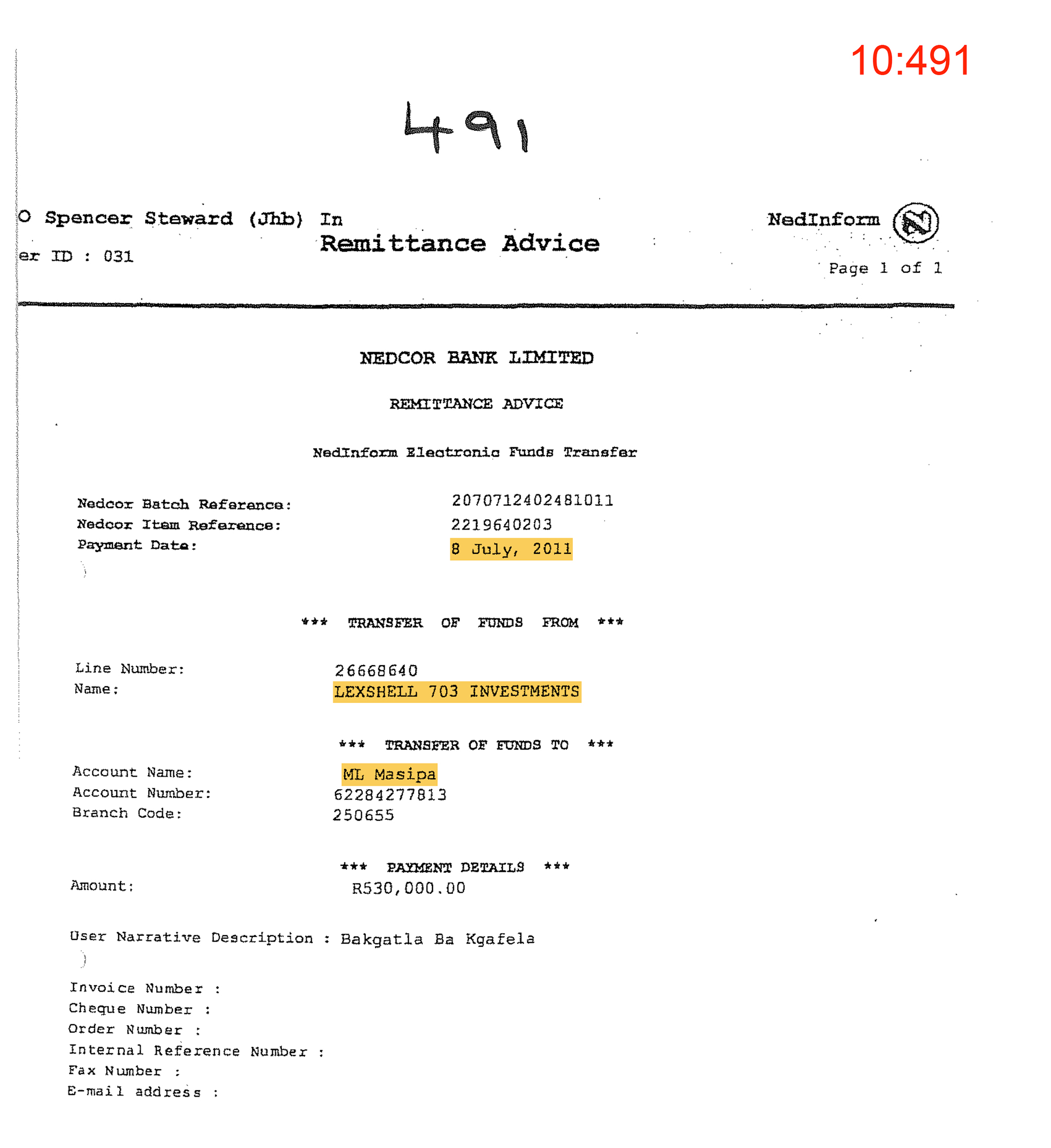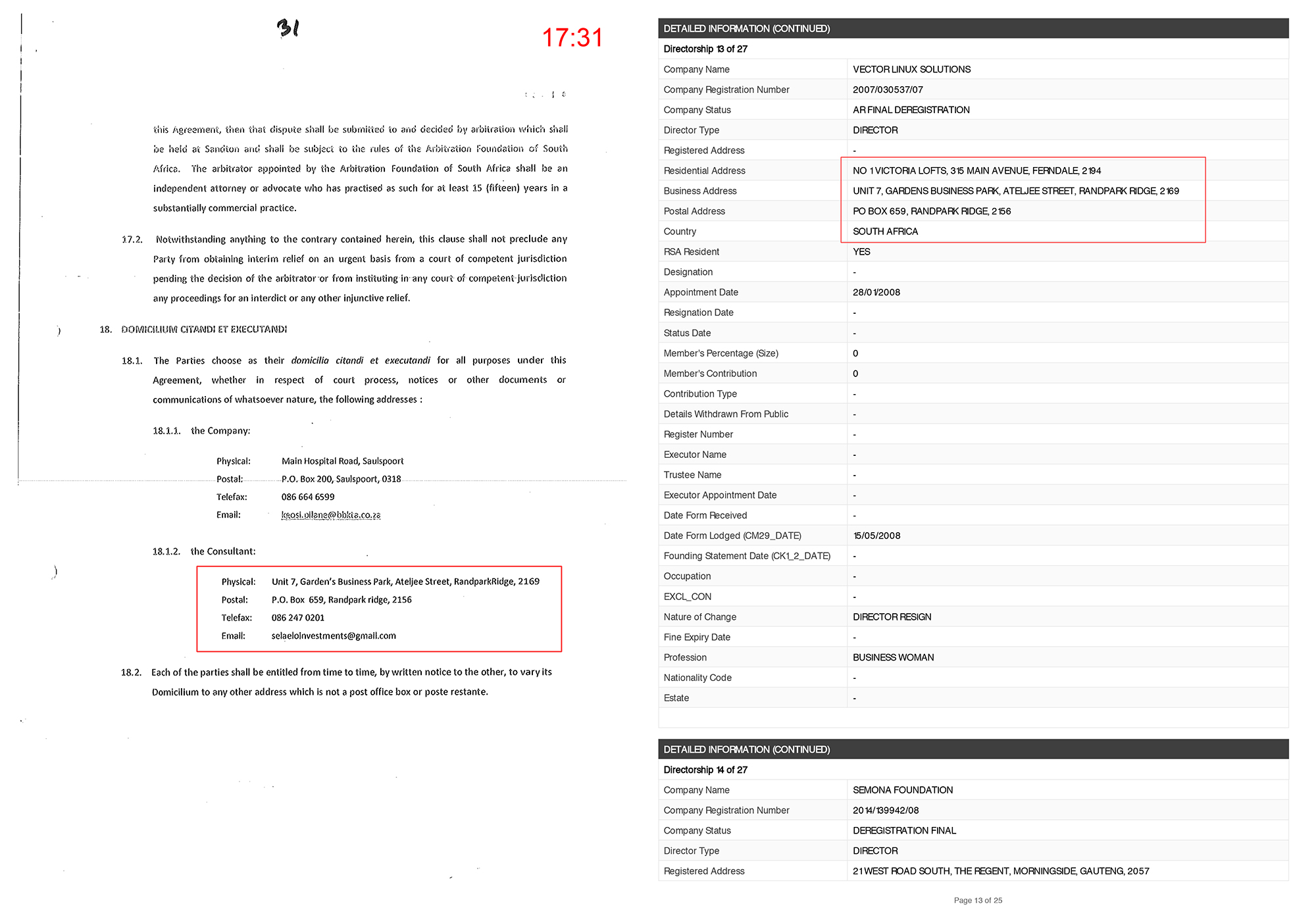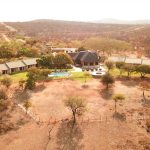Gaslight Inc
Lorraine Masipa’s R2.2bn offshore supply base tender – in spite of past filled with misdeeds

The discovery of oil and gas reserves off the SA coast has resulted in a host of government tenders. Among the less transparent of these has been the supply base facility at the port of Saldanha, which was awarded in 2017 to a company called Saldehco. A founder and director of Saldehco, Lorraine Masipa, has been publicly accused of a long list of crimes — but it seems that not all of her alleged misdeeds have yet come to light, including what may have been her acceptance of a R20m ‘facilitation fee’ for securing mining rights from DMR in 2012.
In June 2016, at a business breakfast hosted by the Transnet National Ports Authority, a slide appeared on the screen that provided an artist’s impression of the mooted R2.2-billion Off-Shore Supply Base (OSSB) at the port of Saldanha. The OSSB, as Transnet’s Ricky Bhikraj explained, had been conceived to take care of the shipping, warehousing and fabrication needs of companies involved in oil and gas exploration off South Africa’s west and east coasts. At the time, given that the government had already started to throw its weight behind Operation Phakisa and the so-called “oceans economy”, the opportunities for investors were obvious – the oil and gas sector, as everyone at the breakfast knew, was all set to become the fastest-growing industry in the country.
“You will find that there’s a very strong business case for this,” said Bhikraj, “and we are hoping that of the many tenderers that have now applied for the concession, we will have identified a prospective candidate by the end of December.”
As it turned out, Transnet would overshoot its deadline by only eight months. In August 2017, the section 56 tender was awarded to a company known as Saldehco Pty Ltd, a special-purpose vehicle that had been established the year before with the sole purpose of winning the concession. At the official signing ceremony in April 2018, the press material listed the principal shareholder in Saldehco as Harps Holdings (a fossil fuel investment company), with the Semona Group (a 100% black- and female-owned energy conglomerate) as the empowerment partner.
What the press material did not reveal was the history of the Semona Group, an oversight so blatant that it spoke of a web of deceit as intricate and opaque as Big Oil itself.
For starters, in May 2016, more than a year before Saldehco was awarded the tender, the Industrial Development Corporation laid criminal charges against the CEO and founder of the Semona Group, Lorraine Masipa. The allegations were that Masipa had run through a R60-million IDC loan in less than a year, which had confounded former employees of the company because Masipa had instituted a programme of retrenchments soon after the loan was granted.

Lorraine Masipa. (Photo: Twitter / @VictorAfrica)
These same sources, who in August 2017 spoke to the Mail & Guardian on condition of anonymity, alleged that Masipa had been “reckless in her spending” – there was mention of overseas trips, a R10-million mansion in Bryanston, a R1.2-million Range Rover and an exclusive apartment at The Regent in Sandton.
Masipa denied that the IDC loan had been used to fund her lifestyle, and by April 2019 the case was still under investigation – in the years since the charges had been laid, the matter had been passed from the Hawks to the National Prosecuting Authority and back to the Hawks again. When Daily Maverick approached Hawks spokesperson Brigadier Hangwani Mulaudzi for an update, the unit could provide no substantive comment on the status of the case despite an acknowledgement from the relevant section head that he was “currently in contact” with the investigators.
Also, although the issue had been raised in the National Assembly in October 2017, under a list of questions that implied the involvement of former public enterprises deputy minister Ben Martins (there had been allegations in the media that Masipa and Martins were lovers), nothing was to come of this tack either.
And so with these details as background, Daily Maverick conducted a CIPC search in late August 2020 – the search revealed that Masipa had remained a director of Saldehco and various Semona subsidiaries. When this was added to the fact that the OSSB was punted in April 2020 as a core project of the Saldanha Bay Industrial Development Zone – defined in the brochure-ware as “a marine services hub geared to tap into the lucrative potential of the recent oil and gas discoveries in the region” – the short-term implications for South African taxpayers became a question of some significance.
As for the long-term implications, those had everything to do with the ravages of climate collapse. But it was the full arc of Masipa’s career, as denoted by the fact that she had once been a director of the Bakgatla Ba Kgafela Strategic Investment Company (BBKSIC), that truly held Daily Maverick’s attention.
***
In the second of a three-part investigative series that Daily Maverick ran from February 2018 to September 2019, we pointed out that the BBKSIC was set up by Kgosi Nyalala Pilane in February 2010 to bring economic development to the Bakgatla Ba Kgafela – a traditional community of around 350,000 people in North West, whose ancestral lands happened to sit atop the richest platinum deposits on Earth. The original purpose of the BBKSIC, as articulated in its mission statement, was “to create a viable and sustainable economic system” for the “reduction of poverty, unemployment and inequality within [the BBK] tribe and local communities”.
As we further pointed out, the BBKSIC did nothing of the sort. Aside from the nepotism that compromised the community’s platinum royalties – a salary of R92,000 a month was paid to Kgosi Pilane’s sister, for instance – the accounting practices of the company verged on the criminal. In his expert report to the Baloyi Commission, forensic accountant George Papadakis stressed the “unreliability” of the financial statements of the BBKSIC, noting that the Bakgatla Ba Kgafela Traditional Council (of which Kgosi Pilane was chair) “had not properly accounted for its loans and investments in BBKSIC and its subsidiary and associate companies”.
For the purposes of the current narrative, the salient fact was that Lorraine Masipa had been appointed director of corporate affairs in the office of Kgosi Pilane in June 2009; nine months later, she would become the first director of the BBKSIC.
On 25 June 2012, a BDO Spencer report (in the possession of Daily Maverick) singled out Masipa for her multiple irregular payments, signature forgeries and suspicious transactions during these dual directorships.
Among the BDO findings were reimbursements for “expenses” in 2011 totalling R623,665.54. The largest reimbursement was for a trip to Botswana, which came in at R530,000. Daily Maverick was able to obtain a copy of the Nedcor Bank Limited remittance advice, which showed that Masipa had received payment of the full R530,000 on 8 July 2011.

While no invoices or supporting documents were provided for the expense claim, the payment motivation submitted by Masipa read in part as follows:
“As every year, the Bakgatla Nation both in Botswana and South Africa host male and female initiation ceremonies… The initial preparations needed to be extended due to delays and the increase in initiates this year and the costs were underestimated. Ms Masipa was unwittingly requested to assist at this point… where costs were also incurred for freight and cross border charges.”
But in its investigation, BDO reported that no freight or cross-border payments were made.
“The review of expenditure revealed that the majority of expenditure related to breakfasts, lunches and dinners,” the report concluded, “where the amounts and the items reimbursed indicate a lavish lifestyle.”
Other issues identified by BDO with respect to Masipa included overpayment when comparing invoice prices with market-related prices, duplicate payments for the same service or item, little to no commercial presence of suppliers, purchases from related parties, and no evidence of service delivery although the service had been paid for.
Despite Masipa having been identified as the main culprit by BDO, Zitha Dube – the CFO in the BBK administration – was held responsible and fired. At the Baloyi Commission, Dube disclosed evidence that clearly implicated Masipa in all of the BDO findings. But, most astonishingly, Dube also provided evidence of a R20-million “facilitation fee” paid to the Department of Mineral Resources (DMR), which had initially been transferred from the account of the BBK Traditional Authority to Selaelo Investments – a company that would later change its name to Semona ICT, a subsidiary of the Masipa’s Semona Group.
***
In the first investigation of the BBK “Stealing the Crust” series, Daily Maverick outlined the series of logically sequenced transactions that led to the establishment of the Sedibelo mega-mine, a monster platinum venture that combined three adjacent deposits on the western limb of the Bushveld Igneous Complex. The names of these deposits were Pilanesberg Platinum Mine, Magazynkraal and Sedibelo Project, and their consolidation was subject to DMR approvals under Section 102 of the Mineral Petroleum and Resources Development Act.
Stealing the Crust: How the Bakgatla Ba Kgafela were robbed of their inheritance
The architect of the deal was Brian Gilbertson, chairman and founder of Pallinghurst Resources Limited, which had been incorporated in 2007 in Guernsey. When they first joined Pallinghurst as BEE partner, the Bakgatla Ba Kgafela owned 90% of Itereleng Bakgatla Mineral Resources (Pty) Ltd – or “IBMR” – a community-owned company established in 2003 to house the mineral rights on the Sedibelo properties. They also had the option to an 80% shareholding in Magazynskraal. But, once the joint venture with Pallinghurst was formed, the Bakgatla agreed to use the company as the “exclusive vehicle” to house their PGM interests.
In other words, with the blessing of the BBK Traditional Authority, Kgosi Pilane signed over almost all of the Bakgatla’s mineral rights to the joint venture. It was then that the logically-sequenced transactions were put into effect.
In February 2011, IBMR agreed to abandon its rights in the Sedibelo West Mining Area, which were the properties immediately adjacent to the Pilanesberg Platinum Mine (PPM). The DMR approvals were needed in order to transfer the Sedibelo West Mining Area from IBMR to PPM, a sub-agreement that was drawn up to expand access to the PGM mineral base and add significant value to the mine. After the go-ahead was secured from DMR, PPM would pay IBMR $50-million.
As the next step in the consolidation plan, the Bakgatla would sell 49.9% of their shares in IBMR to Pallinghurst for $99.8-million. Lastly, the entire deal hinged on the “Sedibelo West Commission Payment Agreement,” whereby the Bakgatla would be paid $25-million for securing all DMR and community approvals.
With speed being of the essence, on around 22 March 2011, the “Sedibelo West Mining Right Abandonment Agreement” was signed – and the Section 102 application was submitted to the DMR for approval. Problem was, as we would find out in late 2018 in the precedent-setting Maledu judgment, Kgosi Pilane was met with fierce resistance by members of the Lesethleng community, who did not give their consent to the deal. This delayed the approval process.
The Sedibelo West Mining Right Abandonment Agreement consequently underwent five amendments during 2011, to extend the timeframe for completion of the sale. It seemed that Pallinghurst and its investor consortium were losing patience, and the final deadline for approvals was set for 31 January 2012.
And so, on 14 January 2012, the BBKTA appointed Selaelo Investments to render consultancy services for the purposes of finalising the transaction “which [had] been unduly delayed at the DMR”.
Although Masipa was not a director of Selaelo Investments in 2011 or 2012 – she would assume directorship duties at Semona ICT, to which Selaelo changed its name, in August 2016 – her long-time colleague and alleged relative, Karabo Masipa, was. More awkwardly, Daily Maverick was granted access to an unsigned consultancy agreement that included the address and domicilium of Selaelo in early 2012, which happened to be the same address of one of the companies listed in Masipa’s CIPC report, Vector Linux Solutions.

In the final agreement, perhaps because it would have implicated Masipa in a huge bribe, the address and domicilium was removed. In clause 5.2 of the agreement, Selaelo undertook to provide a range of services within the timelines stipulated. These included, in Phase 1, procurement of the “approval by the DMR of the abandonment by IBMR of the Sedibelo West portion of its mining right”. In Phase 2, the services of Selaelo extended further, to securing the DMR’s approval for the social labour plan, the environmental management plan, the mining works programme and the IBMR sale of shares agreement.
Again, the consulting fee for these services was R20-million, payable in cash. Whether or not any of the Selaelo directors had special contacts in DMR was impossible to ascertain, but as of September 2020 the application fee for a mining permit in South Africa ranged between R100 and R1,000, with environmental authorisation in terms of the National Environmental Management Act ranging from R10,000 to R20,000.
Either way, on 16 April 2012, the same day that DMR’s chief director of mineral regulations approved the mining right amendment and the environmental management plan, Selaelo sent an invoice to the BBK Traditional Authority, stating that both phases had been completed. Also on that very same day, Kgosi Pilane wrote to Ian Hayes, corporate and commercial director at Cliffe Dekker Hofmeyr Incorporated, instructing him to transfer an amount of R20-million to Selaelo as settlement of the fee.
. ***
Although an employee of Saldehco supplied Masipa’s email address, she did not respond to the list of questions sent to her by Daily Maverick. This appeared to be a deviation from her tendency to deny all claims made against her, which had begun in August 2012 after it was reported that she had been suspended as head of BBKTA corporate affairs for forging an R8-million cheque – “[the] allegation that our client has been suspended on account of forgery is false,” her lawyers informed the Sowetan at the time.
By 2015, that same newspaper would be lauding Masipa for her tenacity as an entrepreneur, in a feature that was sub-titled “Masipa swims with big fish”.
Other media outlets picked up on the hype, with Drum magazine noting in June 2015 that while “allegations of fraud [had] threatened to destroy her career,” Masipa was now the CEO of Semona, “a company that could help offer a solution to SA’s energy crisis”. The Citizen newspaper, for its part, ran a feature in July 2015 under the header “She’s got the power,” which, aside from its titbits on Eskom’s lack of “energy innovation,” was chockfull of advice for aspiring businesswomen.
But it was in the abovementioned Sowetan piece that the seeds of the Saldehco initiative were first divulged.
“Her company is now working on a project that could result in the building of a filling station for ships in the Western Cape,” it was noted, before Masipa herself was quoted.
“I realised that in Saldanha Bay there was no bunkering facility,” she said.
While the path from that statement to the formation of Saldehco could not be traced by Daily Maverick, what was clear was that it had everything to do with the discovery of the extent of the oil and gas reserves off the South African coast.
And so, in April 2018, eight months after it had been awarded the tender, Saldehco signed a facility operator agreement with the Transnet National Ports Authority. Now known as the Saldanha Offshore Support Base (SOSB), it was announced that construction of the facility would begin in the fourth quarter of 2020. Other than saying that prospects for the oil and gas industry had been bolstered by “recent exciting finds,” Saldehco’s chairperson, Sophie Masipa – whose alleged family ties with Lorraine Masipa could not (like Karabo Masipa’s) be established – had little of substance to add.
This was in line with the scant information on the two remaining shareholders in Saldehco, Altus Oil & Gas and Harps Holdings.
The Singapore-headquartered Altus Group, according to its website, had been founded in 1973 as a “leading provider of innovative, integrated, shipping and logistics solutions to the energy, mining and infrastructure sectors”. But this information, which appeared with a link that promised more detail, returned the reader to a page that offered only one more explanatory sentence.
As for Harps Holdings, a non-listed entity in the private market with no IPO filing, it was registered as an Exempt Private Limited Company with an address in Raffles Place, Singapore. In other words, although the company’s various divisions had been operating in the marine, energy and infrastructure space for almost two decades, it appeared to be exempt from statutory auditing requirements.
Still, at the signing ceremony between the Transnet National Ports Authority and Saldehco in April 2018, Singapore’s High Commissioner to South Africa had this to say:
“As far as I know, this is the first Singapore investment in South Africa’s ‘new dawn’. I am told that then Deputy President Cyril Ramaphosa’s visit to Singapore in 2016 played a role in clinching this investment. At R2.2-billion, it is not insignificant. Its success will send a powerful message to other Singapore companies that South Africa is indeed open for business.”
What type of business? The answers, apparently, weren’t on public display. On display instead, as of mid-September 2020, were the accelerating ravages of climate collapse — the shifting of the Arctic climate from ice and snow to water and rain, more record-breaking wildfires on the west coast of the United States, and the presence of five tropical cyclones in the Atlantic Ocean for just the second time in history.
Of course, Lorraine Masipa herself was not personally responsible for any of this. But to Daily Maverick she appeared to be a perfect representative of the global fossil fuel industry, which has been spewing carbon and driving climate change since the dawn of the industrial age.
Because, like just about every conglomerate in the sector, Masipa’s history (as outlined above) could be summed up in three words: unaccountable, unconcerned and un-rehabilitated. DM





















 Become an Insider
Become an Insider
South African crooks are not shy; they are thinking big (with a little help from a friend).
It would be interesting to see if your investigators could ferret out more information of the roles Pallinghurst, Altus and Harps Holdings played in this scam. I suppose it’s a rhetorical question but did the tribal authority gain anything at all out of this deal and did it filter down to the common members of the tribe?
Peter, you said it about the people getting a cent out of this. A perfectly reasonable question to ask but which has by now become rhetorical – since sadly we know the answer. Credit to DM and Mr. Bloom for exposing this nasty little petri dish to the light. May justice soon come knocking.
These revelations, like rolling clouds of a summers’ day (the good research writing) morphing as they roll into clouds of storms (the criminality tragedies), continuously threatening our land, just do that!.
And these just never seem to end! Each new day brings a new story….
another horror story, dreadful stories, about which we would know nothing but for this gallant group of investigators-cum-journos…wonderful folk all!
Whoever you are who might read these essays, these expose’s, and you consequently look for national redemption, ask yourselves what you can do.
An answer lies in these type of questions: who supports evidence-based decisions, who supports the Rule of Law and fair trial, who supports Economic Justice, who supports the principle of cadre placements as illegal and unconstitutional, and who supports non-racialism, inter alia: only one group of would-be leaders in this land; and never forget that answer.
Research these questions properly and the answer almost falls from the sky …and onto, and into, your heads.
And while this story is focused on an individual, perhaps re-read How to Steal A City, or Gangster State, or even The Natal Story: 16 years of Conflict.
a luta continua
sickening